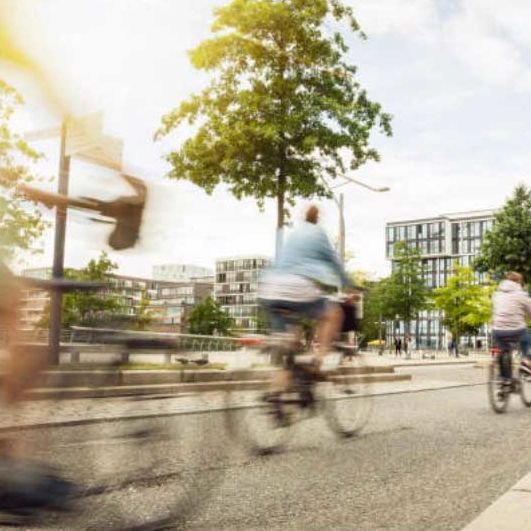Sustainable mobility
thanks to a strict car policy
We are also making efforts to optimize our ecological footprint in respect of business travel and our vehicle fleet. Through the preferential use of virtual meeting technologies, encouraging internal ride sharing, and favoring public transport over taxis or rail travel over rental cars and air travel, we are seeking to make further gradual progress.
With our policies and measures to promote ecological drive technologies, we aim to continuously reduce our emissions in this area. In accordance with our Group-wide Company Cars Policy, we are gradually switching to emission-free vehicles only. By 2025, DEKRA intends to reduce the global CO2 emissions of its vehicle fleet by at least 60 percent compared with 2020. The company aims to achieve a carbon-neutral fleet as soon as possible. The Group-wide target is to include no vehicles with ≥ 50 grams of CO2 per kilometer (WLTP) in the fleet from January 1, 2022, and no vehicles with > 0 grams of CO2 per kilometer (WLTP) from July 1, 2023.
The extent to which we have already succeeded in reducing CO2 emissions in this area is shown by the example of Germany, where DEKRA’s own and leased vehicles were responsible for average CO2 emissions of 444 kilograms per employee in 2021. The figure was still 495 kilograms in 2020 and 584 kilograms in 2019. Average CO2 emissions in grams per kilometer of the German vehicle fleet amounted to 127 grams per vehicle in 2021, down from 134 grams in 2020 and 146 grams in 2019. In absolute figures, the CO2 emissions of DEKRA’s company car fleet in Germany totaled 6,402 metric tonnes in 2021, 369 metric tons of which were compensated by CO2 certificates. By way of comparison, 366 metric tons were compensated by CO2 certificates in 2020. Overall, business travel (by plane, rail, and car) by DEKRA employees in Germany produced average emissions of 1,382 kilograms of CO2 per employee (2019: 1,849, 2020: 1,436).
Lastly, it should not be forgotten that we promote our employees’ use of public transport and bicycles to travel to and from their places of work. For example, at our headquarters in Stuttgart, we offer a subsidized company ticket for the public transportation network and a bike leasing model, which has already been taken up by more than 1,600 employees.
City cycling for the climate

For 21 days, make as many everyday journeys as possible in a climate-friendly way by bicycle instead of by car – this is the idea behind the "city cycling" competition, which was launched in 2008 and is held annually in numerous cities and municipalities in Germany and, since 2017, in other countries as well. In 2021 and 2022 the DEKRA biker team was among those at the start in Stuttgart. While in 2021 a total of 17 bikers cycled almost 4,500 kilometers in three weeks, in 2022 41 cyclists covered more than 11,100 kilometers. Not only was this good for the riders' own health, but it also made a valuable contribution to the climate – in the form of a CO2 reduction of around 660 kilograms in 2021 and more than 1,700 kilograms in 2022.
Self-driving e-shuttles in Hamburg

“emoin” is the name of a pilot project in the Bergedorf district of Hamburg, in which self-driving minibuses with electric drives were used as on-demand transport over a period of six weeks in the fall of 2021. DEKRA was one of five collaboration partners supporting the project along with transport company Verkehrsbetriebe Hamburg-Holstein GmbH (VHH), Continental, the German Aerospace Center, and French minibus manufacturer EasyMile. The three battery-powered shuttles, which can carry 12 people each, are designed to fill the “first and last mile” gap between one's home and closest public transport stops. A team from the DEKRA Technology Center in Klettwitz has already supported EasyMile with technical expertise as a partner in similar projects in places such as Frankfurt and Gera.
En route to an environmentally friendly fleet

DEKRA subsidiary Vehicle Testing New Zealand (VTNZ) has developed a plan for ecological sustainability. One core objective is the switch to a vehicle fleet consisting entirely of hybrid and electric models by 2030. This commitment to modernize the VTNZ fleet is in line with the New Zealand government's electric vehicle program, which aims to decarbonize the country's transport sector. The switch to a fully hybrid fleet will significantly reduce VTNZ's fuel consumption and thus CO2 emissions. Replacing older vehicles with newer, more sustainable models also brings with it the benefit of improved safety features. At VTNZ, intensive thought is also being given to the additional services with which owners of electric or hybrid vehicles can be efficiently supported in addition to the testing business.

Head of Branch Support &
Process Development + Sustainability
Region Germany
"One of the most important sustainability goals is that we minimize negative climate impacts. Which is why it is crucial that we realize greenhouse gas reduction projects."



